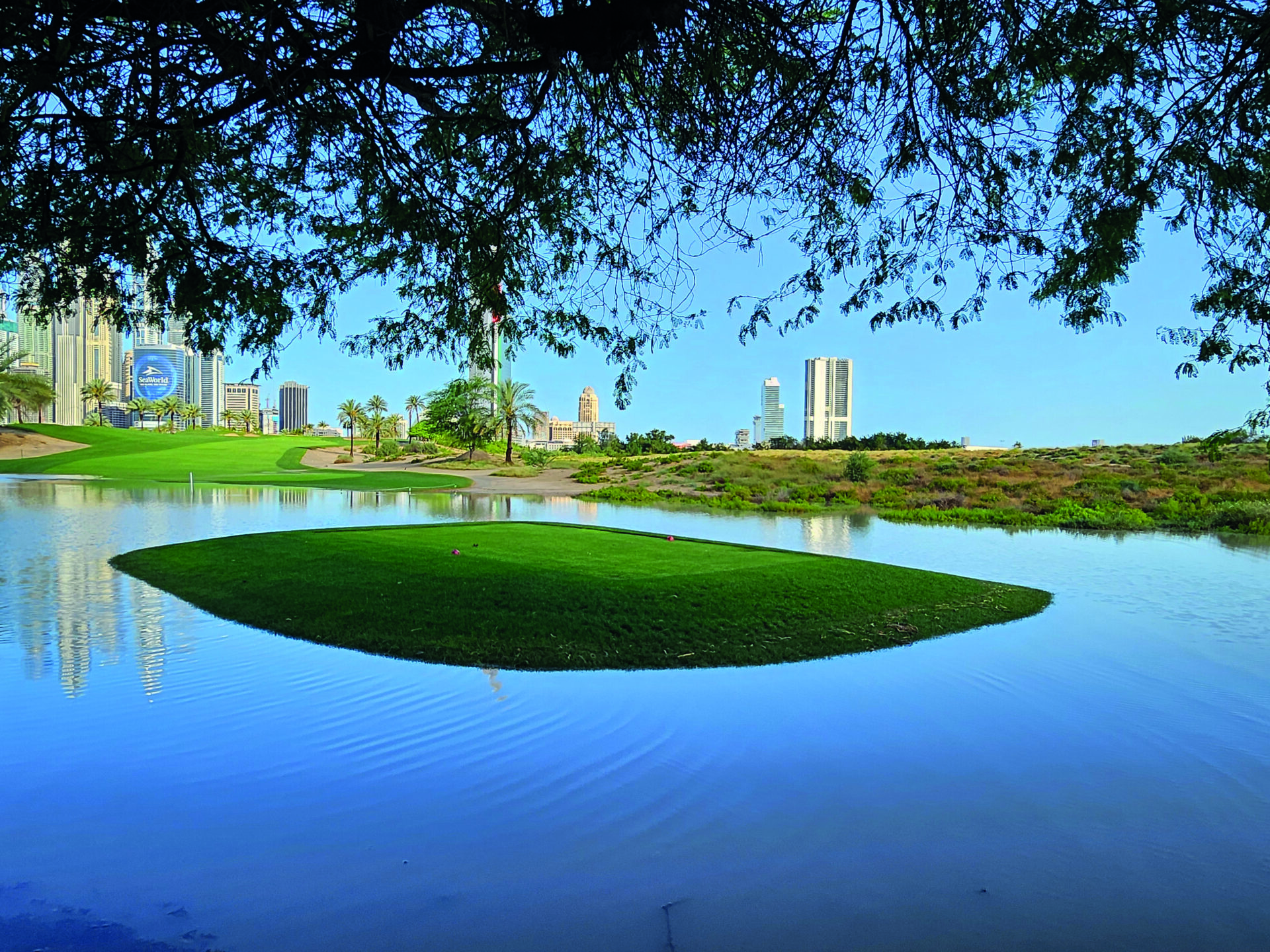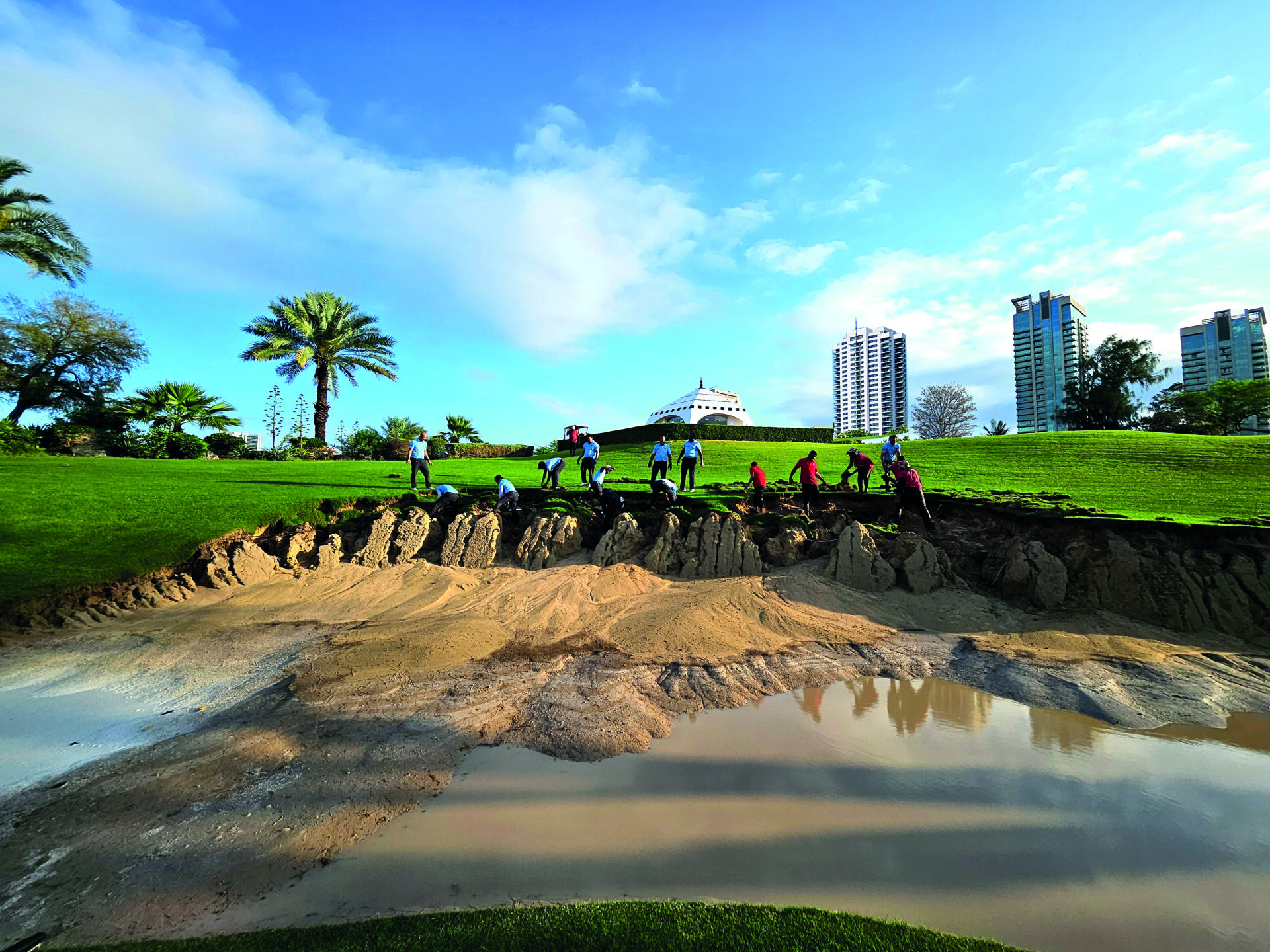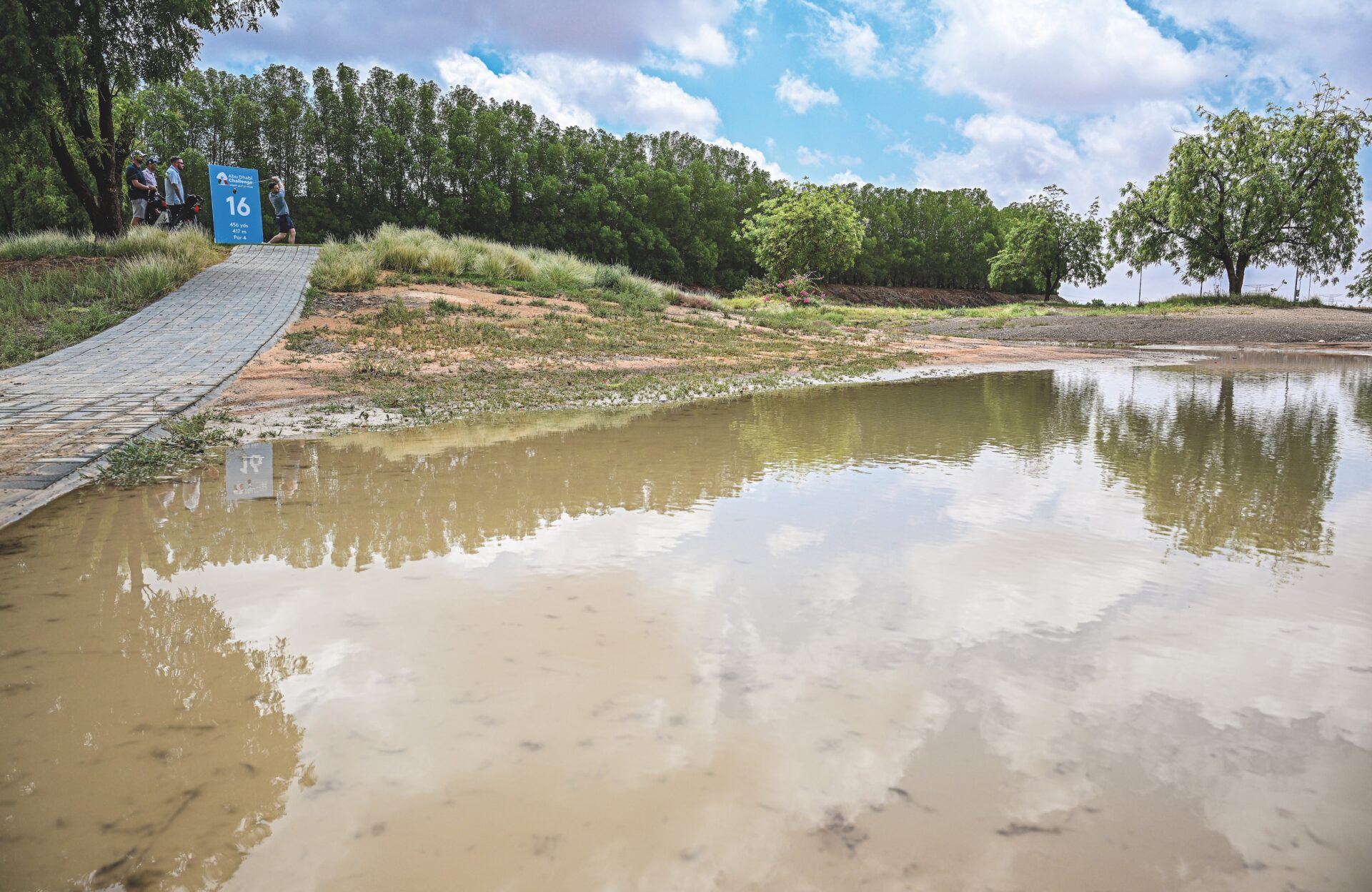Richard Bevan talks exclusively to two of the UAE’s leading golf club agronomists, Thomas Love and Matthew Perry, about the Herculean behind-the-scenes efforts amidst last month’s treacherous storms that got golf courses back in play in astonishingly quick time.
As Billy Ocean said, ‘When the going gets tough, the tough get going’ and for golf club agronomy teams across the GCC, it was literally a case of sink or swim as the region was battered with the worst storms in 75 years.
Of course, the true heroes of the hour where the first responders – the emergency services and brave civilians who battled to save lives and minimise casualties. Let’s be clear about that. But in the world of golf, the tireless efforts of the agronomy teams working around the clock in the most testing conditions to ensure as little disruption as possible to our beloved game, deserves enormous credit.
Among those leading the charge were Al Ain Equestrian Shooting and Golf Club’s Director of Agronomy Thomas Love and Emirates Golf Club’s Course Superintendent Matthew Perry.
The latter is responsible for keeping the Middle East’s most iconic course, the Majlis, as well as its neighbour, the Faldo, in the pristine condition for which it is renowned. For the former, the storms came on the eve of the biggest tournament in the club’s history as the rising stars of the Challenge Tour came to town for the Abu Dhabi Challenge. Love and his team had been preparing for the tournament for some 16 months before the heavens opened on the Tuesday of event week.
“Even a few weeks out I knew it was going to rain but I didn’t really know the extent of what was coming,” says Love. “Then a couple of days before you could see out Bahrain way that it was coming over. It’s disheartening because obviously we started preparing since we were told that this event was going to be here at the start of 2023, especially working on bunkers, because bunkers for our members is usually an issue that gets flagged. So, almost every week we were doing something to the bunkers.
“Then waking up on Wednesday morning and they’re all back to square one pretty much. But we prepared as much as we could. Our Golf Operations Manager, Tom Buchanan, had already pre-ordered four big tankers to come in and then we got five or six small hand pumps as well. In the end only two tankers arrived because there was so much demand across the country.
“Our last hit with the storm was 2am, I came in at 3am and it was Armageddon out here pretty much. I had a quick drive round the course and my first thoughts were that I wasn’t going to be able to get golf out there. But surprisingly, the greens were relatively dry. We managed to cut them that morning.”

‘Getting golf out there’, as Love puts it, is one thing. Hosting a plethora of the game’s hottest emerging talents in a tournament that could prove key to securing a route onto next season’s DP World Tour, is another thing entirely. But after a monster shift that lasted from 3am until 7.30pm, that’s exactly what Love and his team achieved.
“We sent six mowers out and everybody else was pumping water, mainly on bunkers,” says the Scotsman, who learned his trade during an internship in the USA that saw him work on some of the world’s most iconic courses including Bay Hill and TPC Sawgrass, before stints at a string of clubs across the GCC, including Ras Al Hamra in Oman and Arabian Ranches and the Montgomerie in Dubai, prepared him for the step up to become Director of Agronomy at Al Ain in January 2023. “The road that runs along our ninth hole was flooded all the way in to the fairway, so we had the tankers firstly pumping at the entrance of the club, so they could get players and staff and everybody into the club, and then trying and get as much water out of the fairway as possible as well.
“Once we got it down into the desert, the Challenge Tour officials said that was fine, as long as the turf was playable it was okay. And then our guys just worked pumping bunkers, shoveling faces and trying to get the sand areas as good as we could.
“By 7.30pm on Wednesday night we had finished the last bunker. They were still a bit wet, but we had been round, pumped the water out, raked them, sorted out the faces, then we went back round again, let them dry out for a few hours, raked them again, and then came in the next morning, raked them again.
“The players that I spoke to seemed very happy and they were surprised at how dry the fairways were.”
Love is quick to point out that the golf course maintenance game is very much a team sport.
“I couldn’t be happier with the team,” he says. “Every single person in the club mucked in really. Tom Buchanan, who I mentioned before, was up to his knees in water, pumping. Everybody rolled their sleeves up and got stuck in. It’s definitely a proud moment with the team, especially seeing during the final round of the tournament on Sunday, the way the golf course was looking.”

As if overseeing the mammoth effort to get his golf course ready for tournament play wasn’t intense enough, Love also had issues on the home front.
“I was dealing with my own house flooding as well at the same time,” he says. “I’ve got a ten-month-old baby and had no power, so we couldn’t make his porridge or anything. Luckily the tour could see the stress I was under and sorted me out, putting us up in a hotel which really helped alleviate the stress of the situation.”
Down the Al Ain Road at Emirates Golf Club in Dubai, the scene that Matthew Perry encountered on arrival at Emirates Golf Club in the early hours of Wednesday morning was even more severe.
“We clocked just over 250ml of rain, which is a little bit different to other courses,” says Perry. “I know Trump International Golf Club was 144ml and Al Hamra in Ras Al Khaimah was 90ml or something, like that. We have an issue with lakes. We’re very different to the likes of Dubai Creek. Their lakes are quite low and they have retaining walls but our main issue is that we have a lot of sand areas and we have a lot of lakes that are grass banked and so they just burst their banks.”
But, as terrible as these latest floods were, this was not Perry’s greenkeeping team’s first rodeo.
“It’s something that the team are used to,” he says. “The team are very good here, we turned around the Desert Classic quite quickly when we had heavy rains this year, to open on the Thursday afternoon. But this one was a little bit more testing!”
Like Love and his team, Perry had enough advance notice of the impending storms to prep his team to be ready for a long day.
“I live down the road in Jebel Ali, so I actually could get in quite easily, the roads weren’t too bad. It also helps that the team live on site. We’re very different to other golf courses in that respect. We actually have accommodation on site, which is good. We had no worries about the traffic or going home on buses or anything.
“We’d done the normal things that we do to try to prepare, putting sandbags out on certain holes where it gets washed out. But the extremity of those storms was something else. I was pushing water out of Jones the Grocer on Wednesday morning and things like that. We have storm drains and pumping systems there, but you can’t cope with that amount of water.
“If you think back as well, this golf course, when it was built, it was actually marshland. It was actually water and they pumped everything out and built the course. But we have a lot of submersible pumps on the course. They did it right so that we don’t have groundwater issues. A lot of courses in the UAE now do have groundwater issues, mainly because they don’t have the right infrastructure with pumps on the course. They build all these houses and when their water table groundwater comes, they get issues. We don’t really have that. But when it comes to the point where that amount of rain falls down, it’s going to cause a problem.”

Like the team at Al Ain, Perry’s crew set to work with tankers, pumps, shovels and rakes, working long shifts to get the Majlis and the Faldo back in playable condition as soon as possible. At the time of going to press, all but one hole on the Faldo was back open and the Majlis was partially open, with a composite course made up of holes on both courses.
“I think when we had the rain during Desert Classic, the team pulled out the stops and really got it,” says Perry. “But this is another level at the moment. The work that they’re putting in just to get anywhere near having holes open. I’m blessed that I do have a team that are motivated to do their work, to understand the importance of their work, which they do.
“They get the amazing appreciation from management as well. Mustafa, our CEO, wrote a letter to me congratulating the team on the efforts that they’re putting in so we posted that everywhere so people can see the support they’re getting. Those motivational boosts are what they need and they’re getting an abundance at the moment from everyone at the club. I’m always proud of what they do. I have guys that have been working here over 30 years, so they’ve seen it. They’ve seen a lot of different things that happened and they still get up for work at 4am every day and work until 6pm in the evening. So, credit to them and the work that they’re putting in at the moment.”
Perry believes that last month’s storms should serve a stark warning for the future and something all clubs should get used to.
“The winters have changed a lot over the past couple of years with the amount of rain that we now get,” says the Englishman who has worked in agronomy at courses across the region for 18 years. “I remember during Covid we didn’t have rain for like 18 months and now it’s becoming a regular thing. When it happened during Desert Classic last year, and then again this year, I thought, ‘this is maybe a sign of things to come.’
“The way the world is going with different weather conditions, we need to get ahead of it a little bit more now. And I think the government will do the same. They need to look at it going forward with certain drainage facilities on the roads. And we need to do the same, especially for us as a club.”
The experience of dealing with the worst storms the region has encountered in recent memory was undoubtedly a wake-up call for us all. But to the unsung heroes who worked in the rain, while the rest of us slept, so that we could tread the fairways again, we doth our collective cap.